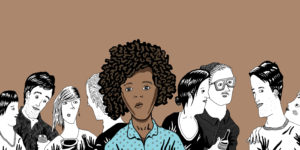By Akilah Richards
Assimilate
verb as·sim·i·late: to adopt the ways of another culture; to fully become part of a different society, country, etc.
Anti-Black racism in America has consistently compromised the physical, emotional, legal and economic rights of the nation’s Black population. In this country, we rank high among the most targeted and least protected of American-born citizens — and that’s only part of the issue. The other engine racism fuels is that of deep inner turmoil of the oppressed people, including low self-esteem and a need to fit into the dominant (white) culture in order to feel recognized and ultimately valued in this society.
To put it plain, America’s anti-Black stance gets re-affirmed every time a Black person internalizes racist messages about Blackness and turns to assimilation as a means of resolving the issue.
For example, one attribute of anti-Black racism is America’s tendency to label pro-Black sentiments as anti-white threats. Notably, America as a nation is historically anti-Black, which is one of the reasons the country (not just Black people) needs pro-Black focused everything as part of regular public and private dialogue. Today, white America still holds to its longtime belief that we (Blacks) are in their (white) country, and should see our presence here as a privilege. And that this privilege should be evidenced by our efforts to make white people more comfortable with our presence.
Those of us who are willing to affirm our humanity and embrace our Blackness by allowing our African features and cultural norms to be part of our self-expression are viewed as angry or ignorant.
Our writings are labeled extreme or unnecessarily focused on “the negative stuff.” Our assertions are viewed as extremes. Our outrage is attributed to unwarranted “race card” plays by people who just can’t seem to move past color. Our gatherings are tagged as riot planning where we look for opportunities to lash out with unprovoked, completely irrational violence.
Racists and disillusioned Black folks alike would have us believe that color/race — not racism — is the issue. The rationale here is that if more Black people would simply be less assertive about Black issues, and stop (incorrectly) labeling all issues as race issues — especially the ones that make white people uncomfortable — then racism would magically disappear.
Black people are battling the choice to affirm our own identities or assimilate so that we can attempt to fit ourselves into whatever version of ourselves we think would be least offensive, threatening or plain weird to white America. And by white America, I mean employers, government officials, higher-ups in academia and decision-makers in law and in media. This affects all Black people, including and perhaps most tragically, our Black children.
For some among us, the way to treat the pain and limitations that come with constantly nursing this wound is to assimilate. If we can just get our hair bone straight, spruce up our voice and diction, make sure our kids don’t sound “too Black,” and make sure that in public, our children steer clear of language, attire and music that America attributes to Black people, then we just keep our children safe. We just might help white America to see that our children can behave, that our children can be trusted, that they’re approachable and smart and safe, that they’re human just like them.
This decision isn’t an automatic issue of self-hatred either — it’s just not that simple. It is almost unbearably difficult for some of us to understand what (about us) is going to stop us from achieving what we work so hard to get for ourselves and our children — financial security and emotional wellness. And if we have to play the game to get to the goal, some of us see that as a much better option than the choice to remain financially restricted and emotionally strained.
Here’s the gaping hole in that argument — no matter what we do, from education to attire to financial success, we won’t change bigoted beliefs.
Whether we’re walking in our neighborhood with a sawed-off shotgun or a pack of Skittles, their perception — not our action — is what causes anti-Black behaviors. Sure, one person can change individual behavior, and that person’s individual experiences with racism might improve. But racism isn’t about one person’s experience, it’s about how a belief held by the dominant culture, influences the rules and actions of the society governed and controlled by that dominant culture. I’m not saying nothing will ever change, nor am I saying it’s futile to try to incite change.
What I am saying is that racism will not end by us morphing into the version of ourselves that is least likely to offend a white person who allows his or her ignorance to supersede a genuine interest in understanding non-white people and culture.
What I am saying is that sending your Black children to school with mostly white people, for example, won’t make racist white people less racist. But it may make your child less aware of who they are, how they are generally viewed in America and, perhaps most importantly, how to manage that reality without surrendering to it.
No matter what we hope and work toward for our children’s future, we are responsible for offering context and guidance based on the state of the world right now. We cannot conscionably look ahead to (or hope for) a post-racist America of tomorrow and not show our children the realities of hella-racist America today.
Assimilate or Adapt: The Differences and the Dangers
The following image is a screenshot (taken by me) from forum on ways to improve American society. I wouldn’t do this forum the honor of a direct link, but I’m sharing the screenshot to present an example of real discussions happening online.
‘It is up to Blacks to assimilate into white society, not the other way around.’
For most Black people living in America — Black immigrants included — bigotry and gross intolerance toward us is neither new nor shocking. Most of us have experienced some version of that same display of territorial chest thumping from racist white people. This particular bigot believes that assimilation is the best route to keeping the proverbial peace and being viewed as relevant or wealth-worthy by the opinions that matter — which, of course, are those of white men. He also framed assimilation as a set of corrective behaviors that when implemented will make Black people more acceptable to white America, and, therefore, more likely to succeed in attaining The Dream.
For those of us who see the clear danger in this skewed logic, what can we do? Particularly as parents raising eventual adults who will face their generation’s version of anti-Black racism in government, in the education system and in the workforce, how do we help our children maintain a healthy sense of self?
One thing we can do today is get clear on the difference between assimilating and adapting. Assimilation is about slow erasure of our unique and valid presence; adapting is about understanding our environment and making some adjustments based on our understanding, all without deliberate effort to keep and prioritize aspects of our unique self, culture and forms of expression.
When we assimilate, we disappear and we feed the false narrative about who we are and what we deserve. When we adapt, we define who we are, and we consciously examine our ideas and actions about how to thrive in America, all with a commitment to affirming our own human-ness and our own worth.
Let’s look at some examples of the difference between the two:
SCHOOL
Assimilate – Decide to enroll your Black child in a
predominantly white school because of the school’s excellent academic reputation.
- You celebrate this victory.
- You tell your child to do well and study hard.
- You do no research about race relations in the school.
- You say nothing to your child about the very common set of issues that Black children in white schools tend to face.
- You simply appreciate being in the (good white) school district, and celebrate yourself for “making it.”
Adapt – Decide to enroll your Black child in a predominantly white school because of the school’s excellent academic reputation.
- You research race relations in the school, focusing on how teachers treat their students. Depending on what you find, you finalize your decision and enroll them.
- You celebrate this victory.
- You tell your child to do well and study hard.
- You empower your child by naming some of the aspects of cultural isolation that they may face and tell them what they can do if they feel those feelings.
- You make sure your child know s/he is not responsible for explaining (to their white peers) why a racist behavior is wrong every time it happens.
- You remind your child that s/he doesn’t have to be like someone to be liked by them.
- You join the PTA board (or volunteer to assist the “class parent”) so you can be part of (or at least be informed about) the decisions on what activities and opportunities are presented to the students.
- You help your child get and stay aware of opportunities to be part of, or start them if necessary, school-based clubs for the Black student population.
- You place more value on your Whole Child (mental, physical, emotional, academic and spiritual wellness) than you do the school system.
SPEECH
Assimilate – Your child uses a (non-profanity) slang term while playing with his friends outside your house.
- You make your child feel bad or wrong for using slang.
- You tell your child not to talk ghetto because that won’t fly in the business world.
- You encourage your child to replace (Black) slang terms with “what they really mean” (read: the standard English version of the term they meant).
Adapt – Your child uses a (non-profanity) slang term while playing with his friends outside your house.
- You explain code switching to your child, so they know that their slang isn’t bad or wrong, they just need to practice “the other language” too, and be aware of the best times to use each one.
- You check your own baggage like any good parent, and you consciously commit to not perpetuating the anti-Black false labels that come with speaking the tongue of our grandmothers.
- You tell your child code switching is rooted in ingenuity and creativity because our ancestors learned to blend known and unknown words together to communicate with people with different native languages and backgrounds.
- You recognize code switching as a life skill your child will need as children take much of their learning online and communicate with children from all over the world.
- You give them examples of how your adult life calls for you to code switch, and how you repeatedly do it successfully.
- You make sure your child knows that they should write essays and most school work in “the other language” but they can use slang in verbal communication in their casual environments.
- You are deliberate about not associating Black slang with any derogatory attributes because a Black person not knowing how to code switch is not the same as an ignorant person.
SURROUNDINGS
Assimilate – You buy a great house in a predominantly white neighborhood.
- You experience a sense of gratitude for your variety of choices when deciding where to raise your family.
- You do nothing to facilitate a balanced experience for your child where they build friendships based on their own connections to children and adults without regard to race and also get to nurture friendships with people who know about your child’s imbalanced socio-cultural environment made up of people who they can talk to about experiences that are unique to Black people.
Adapt – You buy a great house in a predominantly white neighborhood.
- You experience a sense of gratitude for your variety of choices when deciding where to raise your family
- You counter the myth that economic privilege will shelter your Black child from white bigotry by discussing the safest things for your children to do if they are faced with an immediate threat to their safety because of their race.
- You research relevant activities in Black or more culturally diverse surrounding areas to actively affect your child’s interactions with other Black children and families.
- You lead by example and make sure your behavior isn’t based on being so grateful for being able to live in a “good white” neighborhood that you accept being treated differently than any other homeowner in your area.
Black parents are clear that our children need education and strong social skills if they are to have a good chance at success in this country. We know that there’s a game to play, a mindset to develop, relationships to build and a level of savvy to be mastered.
But what we often neglect in our focus on success is the emotional intelligence of Black children. While we support them in building the muscles of excellence in education, we had better help them build self-confidence and emotional stability, too.
I know that to some, this assimilate or adapt argument may seem excessive. But to some of us, this is about self-preservation and human rights. It is reverence for the Black people who lived, fought and died in this country so that we could each be our ambitious, curious, liberation-minded self.
And so that we don’t have to be someone we are not in efforts to validate our existence, or prove our humanity to anyone, even if they hold a position of power in this country. When we choose to adapt versus assimilate, we make a clear statement that our collective task (contrary to the dominant message) is NOT to minimize white discomfort about Black culture by trying to emulate it in our own attire, speech, mindset and religious practices.




